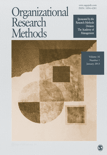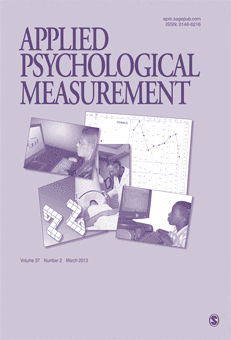
ORGANIZATIONAL RESEARCH METHODS
Scope & Guideline
Advancing Organizational Insights with Methodological Excellence.
Introduction
Aims and Scopes
- Methodological Innovation:
The journal emphasizes novel methods and techniques for conducting organizational research, including advanced statistical models, qualitative approaches, and computational methods. - Integration of Theory and Practice:
A key aim is to bridge theoretical frameworks with practical applications, ensuring that methodologies are not only rigorous but also relevant to real-world organizational challenges. - Focus on Measurement and Assessment:
The journal is dedicated to improving measurement practices in organizational research, exploring issues such as construct validity, reliability, and the development of new assessment tools. - Emphasis on Replicability and Rigor:
Promoting replicability and methodological rigor is central to the journal's mission, encouraging researchers to adopt best practices in their methodological approaches. - Interdisciplinary Approaches:
The journal supports interdisciplinary research that draws on various fields to enrich organizational studies, incorporating insights from psychology, sociology, and data science.
Trending and Emerging
- Advanced Computational Methods:
There is a rising interest in computational techniques, including machine learning and natural language processing, which are being utilized to analyze complex organizational data and enhance methodological rigor. - Qualitative Meta-Analysis and Synthesis:
An increasing focus on qualitative meta-studies indicates a trend towards synthesizing qualitative research findings, allowing for richer insights and theoretical advancements in organizational contexts. - Dynamic and Multilevel Modeling:
Recent papers highlight the significance of dynamic and multilevel models that reflect the complexity of organizational behavior and interactions, demonstrating a shift towards capturing these intricate relationships. - Innovations in Measurement Techniques:
Emerging themes include the development of new measurement tools and approaches that address issues of construct validity and reliability, ensuring that assessments in organizational research are robust and nuanced. - Focus on Contextualized Research:
There is a growing emphasis on conducting research that is sensitive to the context of organizational phenomena, incorporating diverse perspectives and situational factors into methodological designs.
Declining or Waning
- Traditional Survey Methods:
There is a noticeable decline in the use of traditional survey methods as researchers increasingly explore more complex and nuanced data collection techniques, such as qualitative methods and computational analyses. - Basic Statistical Techniques:
The reliance on basic statistical methods is waning in favor of more sophisticated modeling approaches, reflecting a shift towards addressing complex organizational dynamics. - Descriptive Studies:
Descriptive research designs are becoming less common as the journal increasingly prioritizes studies that offer theoretical advancements and methodological innovations. - Focus on Single Method Studies:
The trend of publishing studies that rely solely on one methodological approach is decreasing, as there is a growing preference for mixed-methods research that integrates various perspectives. - Overly Simplistic Models:
The journal is moving away from simplistic modeling approaches that fail to capture the complexity of organizational phenomena, favoring models that acknowledge and address this complexity.
Similar Journals

Qualitative Research in Accounting and Management
Innovating the future of accounting and management research.Qualitative Research in Accounting and Management is a leading academic journal published by Emerald Group Publishing Ltd, dedicated to advancing the fields of accounting and management through rigorous qualitative methodologies. With an ISSN of 1176-6093 and an E-ISSN of 1758-7654, this journal has established itself as a vital resource for researchers, practitioners, and students alike, promoting innovative and insightful contributions that shape current and future practices. Positioned in the Q2 category for both Accounting and Business and International Management as of 2023, it ranks impressively within its fields, holding a percentile of 70th in Accounting and 62nd in Business. This journal not only provides a platform for in-depth qualitative studies but also fosters interdisciplinary dialogue on emerging challenges and theoretical developments. By publishing high-quality research, it aims to bridge the gap between academic inquiry and practical application, making it an essential reference for those engaged in the exploration of qualitative dimensions within the business and accounting landscapes.

BRITISH JOURNAL OF MATHEMATICAL & STATISTICAL PSYCHOLOGY
Innovating Methodologies for Complex Psychological ResearchThe British Journal of Mathematical & Statistical Psychology, published by Wiley, is a prestigious peer-reviewed journal that plays a pivotal role in advancing the interdisciplinary fields of psychology, mathematics, and statistics. With an ISSN of 0007-1102 and an E-ISSN of 2044-8317, it boasts a Category Quartile ranking of Q1 in diverse areas including Arts and Humanities, Medicine, Psychology, and Statistics and Probability as of 2023, signifying its considerable impact and relevance. This journal provides a platform for the dissemination of high-quality research and innovative methodological advancements that address complex psychological phenomena through rigorous statistical frameworks. It covers a breadth of topics from classic problems to modern data analytic techniques, appealing to researchers, professionals, and students alike. Founded in 1965, the journal continues to thrive global scholarly dialogue until 2024, fostering collaboration among disciplines and enhancing understanding of psychological data. Although it is not an open access journal, its rigorous selection process ensures that only the most significant and impactful research is published, further maintaining its esteemed position within the academic community.

APPLIED PSYCHOLOGICAL MEASUREMENT
Transforming Data into UnderstandingApplied Psychological Measurement is a leading journal in the field of psychology and social sciences, published by SAGE Publications Inc. since its inception in 1977. With an impressive 2023 impact factor and consistently ranking in the Q1 quartile for both Psychology and Social Sciences categories, this journal plays a pivotal role in disseminating high-quality research that advances the understanding of psychological assessment and measurement methodologies. The journal embraces a diverse array of research contributions, ranging from empirical studies to theoretical discussions, covering critical topics that affect practitioners and researchers alike. With its comprehensive scope and rigorous peer-review process, Applied Psychological Measurement serves as an essential resource for researchers, professionals, and students aiming to deepen their knowledge and application of psychological measurement within various social contexts. The journal is based in the United States, ensuring a prominent platform for international discourse.

GROUP & ORGANIZATION MANAGEMENT
Unraveling the Complexities of Team DynamicsGROUP & ORGANIZATION MANAGEMENT, published by SAGE Publications Inc., stands as a premier interdisciplinary journal focusing on the dynamics of groups and organizations within the fields of applied psychology, organizational behavior, and human resource management. With a distinguished Q1 ranking across multiple categories—specifically, Applied Psychology, Arts and Humanities, and Organizational Behavior and Human Resource Management—this journal is acclaimed for its rigorous peer-reviewed research and impactful contributions. The journal aims to promote scholarly dialogue and practical advancements that enhance understanding of group processes and organizational phenomena. With its long-standing history—from its inception in 1976 to the present—and a notable Scopus Rank that places it within the top tiers of its category, GROUP & ORGANIZATION MANAGEMENT is essential reading for researchers, practitioners, and students who are keen on exploring innovative theories and applications within this critical field.

PSIKHOLOGICHESKII ZHURNAL
Bridging Theory and Practice in PsychologyPSIKHOLOGICHESKII ZHURNAL, with ISSN 0205-9592, is a prominent academic journal published by the Russian Academy of Sciences and the State Academy University of Humanities (GAUGN). Situated in the Russian Federation, this journal has been a vital resource in the field of psychology since its inception in 1984, with publication coverage extending from 1996 to 2024. Although classified in the Q3 category under psychology (miscellaneous) for 2023, PSIKHOLOGICHESKII ZHURNAL offers valuable insights and contributions to the understanding of diverse psychological phenomena, making it an appealing platform for researchers, professionals, and students alike. Though currently not an open-access journal, it holds a significant position, ranking 171 out of 216 in general psychology according to Scopus, highlighting its role as a contributor to scholarly dialogue in the field. Researchers seeking to explore the complexities of psychological studies are encouraged to engage with this journal, thereby enriching their academic and professional pursuits.

PSYCHOLOGICAL METHODS
Leading the Charge in Innovative Psychological Research MethodsPsychological Methods, published by the American Psychological Association, is a leading journal in the field of psychology, recognized for its rigorous approach to the methodology of psychological research. With an ISSN of 1082-989X and an E-ISSN of 1939-1463, this esteemed journal facilitates the dissemination of innovative methods and analysis techniques that are critical for advancing psychological science. Its impressive ranking as Q1 in both the History and Philosophy of Science and Psychology (miscellaneous) categories underscores its influence, while its Scopus rank places it in the top 2 out of 97 journals in its field, reflecting its high visibility and importance among researchers, professionals, and students. Although not an open-access journal, Psychological Methods continues to serve as a vital resource for the latest advancements and discussions, aiming to enhance the quality of psychological research globally. With a publication history spanning from 1996 to 2024, it remains a cornerstone for scholars committed to elevating the methodological standards prevalent within the discipline.

Business Systems Research Journal
Fostering Collaboration for Business ExcellenceBusiness Systems Research Journal (ISSN: 1847-8344; E-ISSN: 1847-9375) is a distinguished academic publication, launched by SCIENDO, that has been a vital platform for research discourse in the fields of business, economics, and information systems since its transition to an Open Access model in 2010. Based in Poland, this journal serves as a nexus for innovative methodologies and theoretical frameworks that address contemporary challenges in economic systems, management information systems, and technology innovation. With its recent ranking in the Q2 tier in Economics, Econometrics, and Finance (miscellaneous) alongside Q3 rankings in key related areas, the journal is recognized for its quality contributions and emerging influence, as evidenced by its standings in Scopus and category quartiles. As a valuable resource for researchers, professionals, and students alike, the Business Systems Research Journal aims to foster collaboration and knowledge sharing that drive advancement and insight within a rapidly evolving global market.

Organizational Psychology Review
Advancing insights into workplace dynamics.Organizational Psychology Review, published by SAGE Publications Inc, stands as a pivotal journal in the realm of applied psychology and organizational behavior. With an impressive impact factor reflecting its significance—ranking in the Q1 category across multiple fields including Applied Psychology, Organizational Behavior and Human Resource Management, and Social Psychology—this journal is essential reading for researchers and professionals seeking to deepen their understanding of workplace dynamics and human behavior in organizational settings. Its respected Scopus rankings further underscore its relevance, placing it among the top tier of journals in related disciplines. Established in 2012, the journal continues to publish high-quality research until 2024, providing invaluable insights and fostering academic discourse. Although it operates on a traditional subscription model without open access, the journal remains accessible to institutions, facilitating knowledge-sharing within the community. By nurturing rigorous research and innovative perspectives, the Organizational Psychology Review serves as an indispensable resource for those committed to advancing the science and practice of organizational psychology.

Qualitative Research in Organizations and Management
Transforming Understanding through Qualitative ResearchQualitative Research in Organizations and Management, published by EMERALD GROUP PUBLISHING LTD, is a leading journal that delves into the intricacies of qualitative research within the broad spectrum of organizational studies. With an ISSN of 1746-5648 and E-ISSN 1746-5656, this journal has been pivotal since its inception in 2001, continuing its contributions through 2024. It is highly regarded within its field, achieving a Q2 ranking in both Business, Management and Accounting and Organizational Behavior and Human Resource Management as of 2023. By offering a platform for innovative qualitative methodologies and theoretical frameworks, the journal fosters a rich dialogue among researchers, practitioners, and students interested in enhancing organizational effectiveness and understanding human resource dynamics. While currently not an open-access journal, the valuable insights and research findings published here are instrumental for anyone aiming to deepen their understanding of organizational behavior and management practices in today’s complex work environments.

Journal of Work and Organizational Psychology-Revista de Psicologia del Trabajo y de las Organizaciones
Driving impactful change in workplaces through scientific exploration.The Journal of Work and Organizational Psychology (Revista de Psicologia del Trabajo y de las Organizaciones) is a leading open access journal dedicated to advancing research and practice in the fields of organizational behavior, human resource management, and social psychology. Published by the COLEGIO OFICIAL PSICOLOGOS MADRID, this esteemed journal has been contributing to the scientific community since 1985. Its commitment to rigorous peer-reviewed research is underscored by its impressive Scopus rankings; it holds a rank of #82 out of 310 in Social Psychology and #75 out of 230 in Organizational Behavior, positioning it in the top quartile of its category as of 2023. Operating from Madrid, Spain, and boasting an H-index that reflects its influence in the academic sphere, the journal encourages submissions that foster innovative insights and practical applications within the workplace setting. Researchers, practitioners, and students are invited to explore and contribute to this vital resource that shapes understanding and strategies in today's dynamic organizational landscapes.